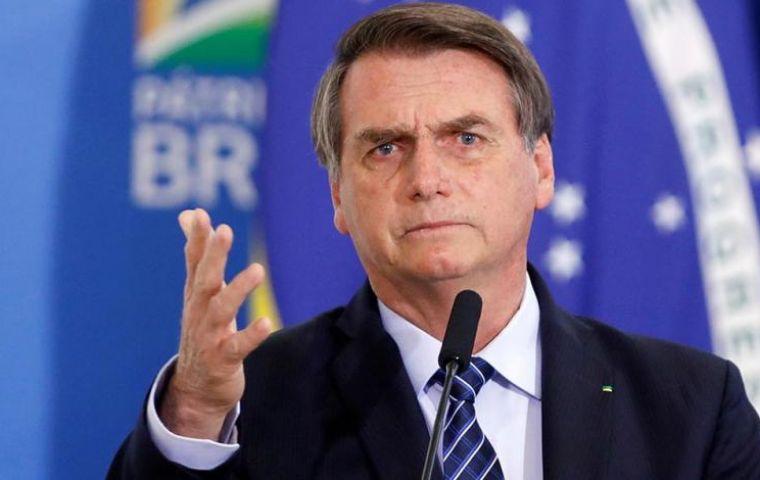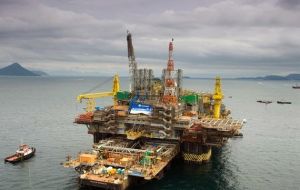MercoPress. South Atlantic News Agency
Brazil has become a beacon for Big Oil foreign investment in the energy sector
 Bolsonaro has made dramatic strides toward expanding global energy firms’ role in Brazil: bidders in oil auctions expected to fetch US$ 28 billion in signing bonuses.
Bolsonaro has made dramatic strides toward expanding global energy firms’ role in Brazil: bidders in oil auctions expected to fetch US$ 28 billion in signing bonuses.  Beyond the billions of barrels of oil becoming available off its coast, Brazil’s new government has also been a beacon for foreign investment in the energy sector.
Beyond the billions of barrels of oil becoming available off its coast, Brazil’s new government has also been a beacon for foreign investment in the energy sector. When oil executives arrive in Rio de Janeiro this week for Brazil’s biennial Offshore Technology Conference, they will find themselves in Latin America’s most promising market for Big Oil by far. This signals a dramatic change from only a year ago.
In early October 2018, Brazil’s current president, Jair Bolsonaro, was in a tight electoral race with Fernando Haddad of the populist Workers’ Party. Global executives feared a Haddad victory would reverse recent pushes to provide them an opening in Brazil’s oil industry, which for years had been dominated by state-run Petrobras.
Elsewhere in the region, Brazil at the time had fierce competition in the race to attract capital. In effect business-friendly governments in Argentina and Ecuador were auctioning exploration blocks and working to lure foreign oil companies.
In Mexico, leftist President Andres Manuel Lopez Obrador had not yet taken office, and investors were still benefiting from free-market reforms that had opened up access to prized oilfields in the Gulf of Mexico.
But in the last twelve months, many of those competitors have effectively taken themselves out of the game.
Lopez Obrador, widely known as AMLO, halted a liberalization of Mexico’s energy market. Protests and economic crises have undercut Argentina and Ecuador’s would-be reformers.
By contrast, Bolsonaro has made dramatic strides toward expanding global energy firms’ role in Brazil — with over a dozen bidders in back-to-back oil auctions next week expected to fetch around US$ 28 billion in signing bonuses.
“These are different markets, but the trend when you look at everything that’s going on, is that Brazil is held in high regard,” said oil and gas specialist Alexandre Calmon, a partner at law firm Tauil & Chequer.
Beyond the billions of barrels of oil becoming available off its coast, Brazil’s new government has also been a beacon for foreign investment in the energy sector.
The previous government, under former President Michel Temer, had already taken key steps to open up Brazil’s energy market, easing restrictions on equipment imports and creating a schedule for oil auctions, among other measures.
Since taking office in January, President Bolsonaro has doubled down, tapping free-market advocates to run the Economy Ministry and Petrobras. They have overseen billions of dollars in asset sales, working to dismantle state control of fuel refining and distribution while opening former Petrobras fields to new players.
In Mexico, AMLO has suspended scheduled auctions and is focusing the strategy to boost output on contracts to oil service firms in which Pemex maintains firm control over oilfields.
Ecuadorian President Lenin Moreno has been weakened by protests. On Sunday, Argentines voted President Mauricio Macri out, returning leftists to power who have previously urged the nationalization of energy assets.
“The Brazilians have been very disciplined even after the government change. Petrobras ... has finally shown a coherent divestiture program,” said Gonzalo Monroy, a Mexico-based energy analyst. “Mexico not only fell behind, it also changed its vision on the industry.”
Next week could cement Brazil’s ascendance, as 14 companies — a who’s who of oil majors — will bid on Nov. 6 in Brazil’s so-called transfer-of-rights (TOR) auction. Fixed signing bonuses total 106.5 billion Reais (some US$ 26.4 billion).
The TOR area, which will be auctioned off in four pieces, is considered a rare prize, as it is already known to hold billions of barrels of untapped crude.




Top Comments
Disclaimer & comment rules-

-

Read all commentsFrom the carriage floor, I think Bolsonaro doesn't finish 2019 as president of Brazil.
Oct 30th, 2019 - 12:27 pm 0https://www.youtube.com/watch?v=WoLHaXFRVQg&t=424s
@Brasileiro
Nov 01st, 2019 - 08:35 pm 0REF: “I think Bolsonaro doesn't finish 2019 as president of Brazil”:
Either that or 2019 will finish him:
https://domtotal.com/img/charges/2574.jpg
Commenting for this story is now closed.
If you have a Facebook account, become a fan and comment on our Facebook Page!